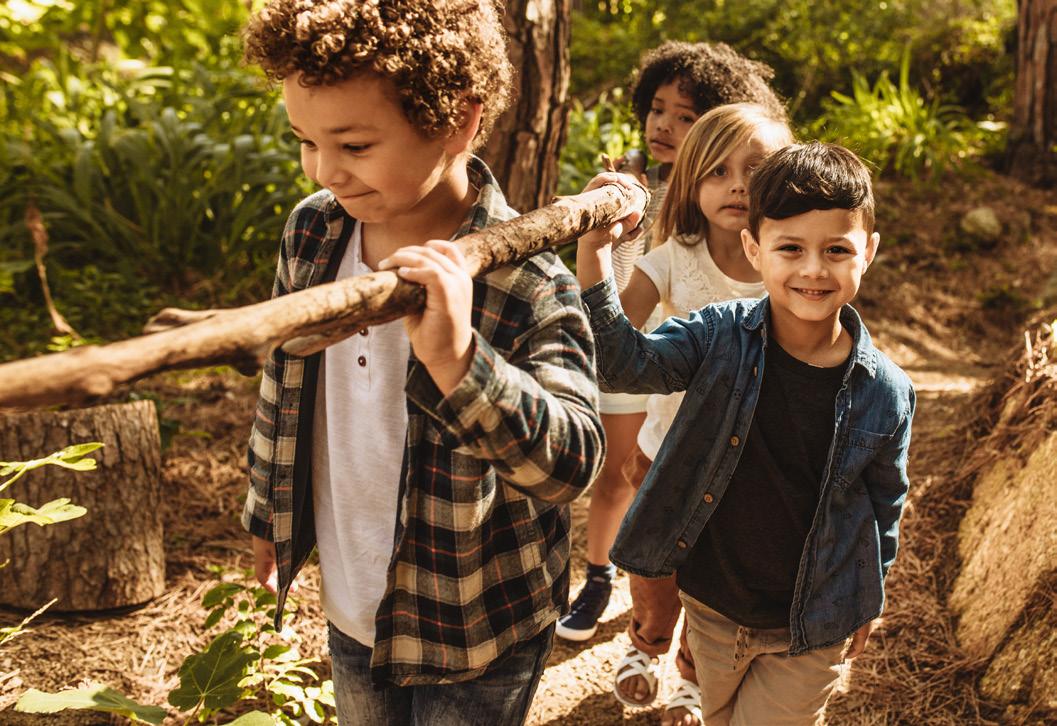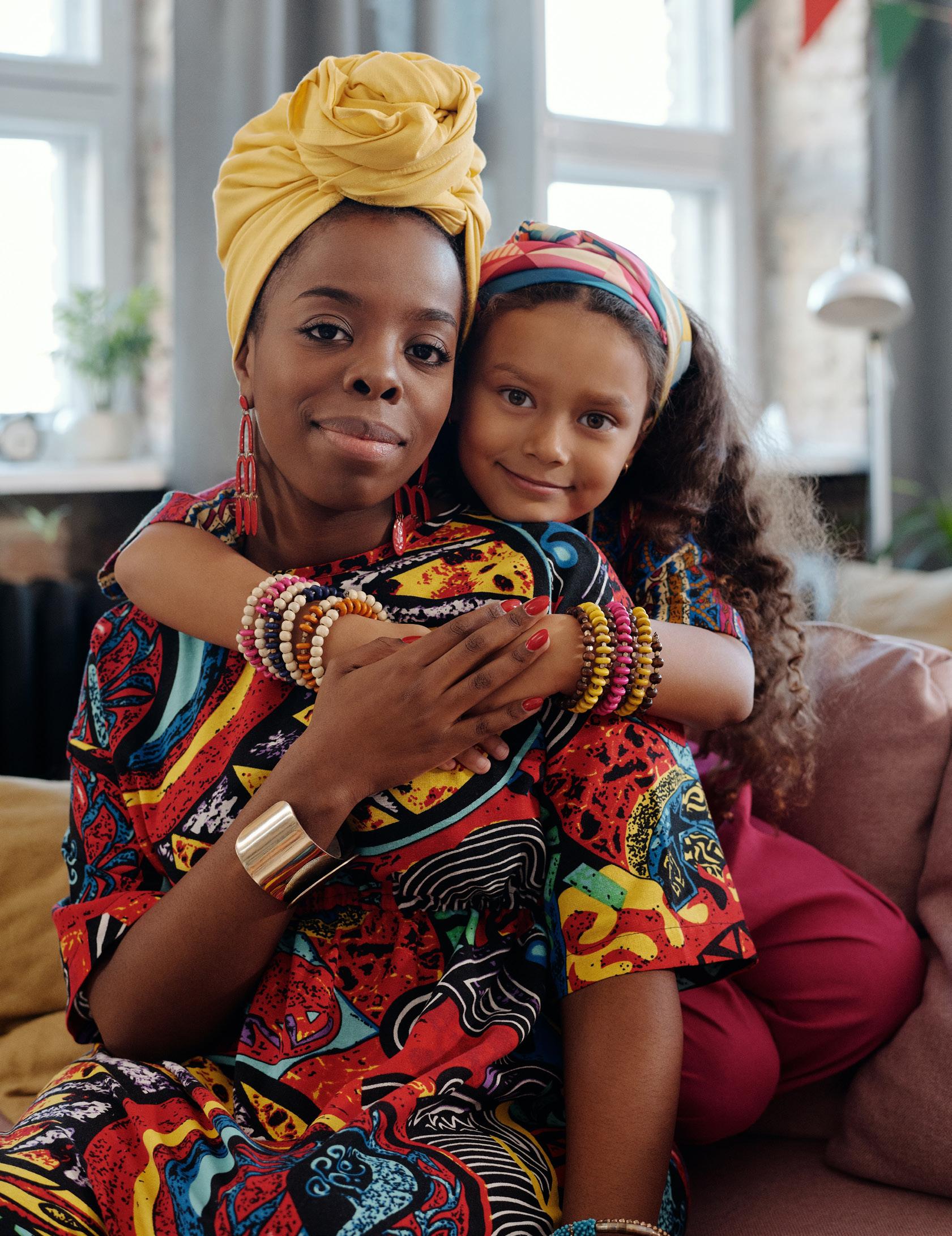
6 minute read
Teach Your Children Well
by Bridgett Wheeler
For many, paying tuition for private Montessori can be a struggle that demands certain sacrifices. Is it worth it? One parent discusses why she thinks so.
You're driving through a fancypants neighborhood daydreaming about kitchen upgrades and you hear it: that alluring little voice that reminds you that you, too, could have quartz counter tops if you just send your kids to public school. It's not that public schools are bad. You went to public school and so did most of your friends—all are decent humans. Except Karen, but let’s not go there.
You start to make a case for all the things you would do for your child if you didn't have to pay that tuition: We could invest the money towards their college fund ... We could take international trips and experience different cultures ... or .... Let’s be real. It’s unlikely you will be diligent enough to put all the saved funds towards your kid’s 529 plan, and an international trip will be so much more meaningful to a child who has the global understanding that comes with a Montessori education.
It’s normal to let this little voice take over sometimes. So far, you have made a selfless choice to sacrifice for the betterment of your child. But now, your child is starting kindergarten or the first grade, and there is a free option. It’s tempting to throw in the towel, or should I say ... “folding cloth.”
So why should you continue to send your child to a Montessori school instead of a more traditional elementary school? How do they differ and what makes Montessori better?
There are five aspects found in elementary Montessori program that you rarely find so well balanced in most schools: a love of learning, a desire to understand deeply, values that are universal, a global perspective, and a tradition of community service.
Okay, that’s great. How does this help my kid get into MIT? Let’s break it down ...
I. Inspiring Children to Work Hard and Achieve Academic Excellence
Montessori is one of the most sophisticated pre-collegiate programs available anywhere in North America. It has been described as the ultimate giftedand-talented program that is offered to a very wide range of students. However, this doesn’t tell the whole story. What makes Montessori special is its ability to nurture talent without needless competition and stress. In a nutshell, Montessori children never lose the joy of learning.
Montessori is, first and foremost, concerned with a child’s character and emotional development, rather than academics for grades and test scores alone. Montessori inspires children toward academic excellence and nurtures the curiosity, creativity, and imagination hidden within every human being. A Montessori program is based on warmth, kindness, and respect. There is a strong sense of community among the children. The classes are more like little villages, with powerful friendships and a clear sense of group identity. Teachers are normally seen as mentors and friends.
II. Building Character and Teaching Universal Values
There is an old saying that if you abandon a garden, the weeds will run wild. Abandon a child’s moral and spiritual education, and the weeds of confusion, materialism, self-centeredness, and spiritual emptiness will take hold.
Dr. Montessori observed that the elementary years are a sensitive period for moral reasoning. The elementary program integrates character development and family involvement throughout the curriculum.
The teaching of kindness and courtesy, self-discipline and selfrespect, and fundamental values is crucial in a child’s moral development, sense of dignity, and academic success. With proper guidance from parents and educators, children can (and will) excel.
III. Montessori Schools Strive to Create Global Understanding
They tend to attract teachers from all over the world. It is normal to find an international student body in a Montessori school anywhere in the world.
Montessori schools generally teach at least one foreign language and often offer programs in several.
World geography, international cultural studies, and world history are central to the elementary Montessori curriculum. Elementary Montessori students begin to understand the global economy.
As more Montessori schools develop strong upper elementary and middle school programs, many are beginning to sponsor travel-study programs. Some participate in the Montessori Model United Nations and foreign exchange programs.
IV. Service
Children must be inspired to contribute to the betterment of the world. They often begin with projects that care for the environment: planting trees and flowers; composting garbage; controlling erosion around the campus; recycling; and cleaning up litter and debris in the local community. It is quite common for elementary classes to adopt an acre of rainforest in Costa Rica or work to support an environmental organization, such as the Wildlife Federation.
They will normally progress to projects that provide direct help to the needy. Younger children commonly collect canned goods, clothing, and toys for the homeless or needy families. As they are ready, most Montessori schools will take children out into the community. As they reach the upper elementary class, Montessori children become quite concerned about issues of social justice and human rights. The rights of the poor, homeless, and hungry are of real concern. Some children will begin to explore the possibilities of supporting causes that are meaningful to them.
When my mind strays to thoughts of many ways that I could spend tuition money on so many other things, I remember that right now is the time that I can really help my child. As a parent, we don’t get do-overs. The seniors that graduate from my children’s Montessori school not only get into great colleges but, more importantly, go on to graduate. By the way, many Montessori graduates win scholarships, because colleges and universities recognize the value of a Montessori education.
Right now, when your child is too young to make choices about where they go to school, what they are going to eat for dinner, or how to budget for a new car to go on vacation, it’s all in the hands of their parents. By the time your children are in high school or college, they are ready and able to make more small and big choices for themselves; however, right now, the choices that determine the trajectory of your child’s life are in your hands. Choose well.
Bridgett Wheeler was introduced to Montessori in 2020 when her daughter began in the toddler classroom at NewGate, The Montessori Foundation’s lab school. Bridgett has a B.A. in Anthropology from Florida Gulf Coast University. She excels in networking, observation, workflow management, and systematic approaches to problem-solving. Her past roles saw her meet and exceed the operational needs of several organizations throughout her professional career, in diverse fields ranging from tribal government to the publishing industry.


Recipe: Preserving Children
INGREDIENTS: PROCESS:
1 large field 4-6 children 3 dogs Goat or donkey (optional) Grass Trees Flowers Rocks Pool of water or stream Hot sun Deep blue sky r Mix the children with the dogs and goats. r Add next four ingredients. r Pour Out onto the field near the water. r Cover all with blue skin and sunshine. Mix in a little rain for variety if you like. r Bake under the sun until children are well satisfied. r Set them in away in the bathtub to cool. r Serve them dinner. r Read a story. r Tuck them into bed.










